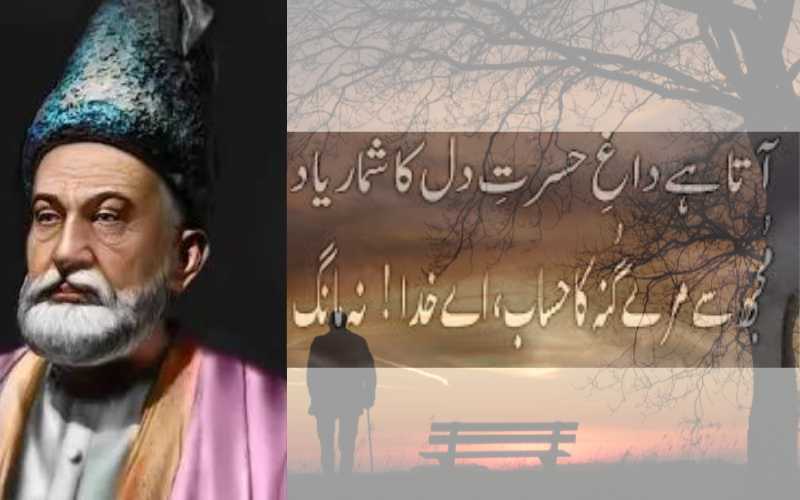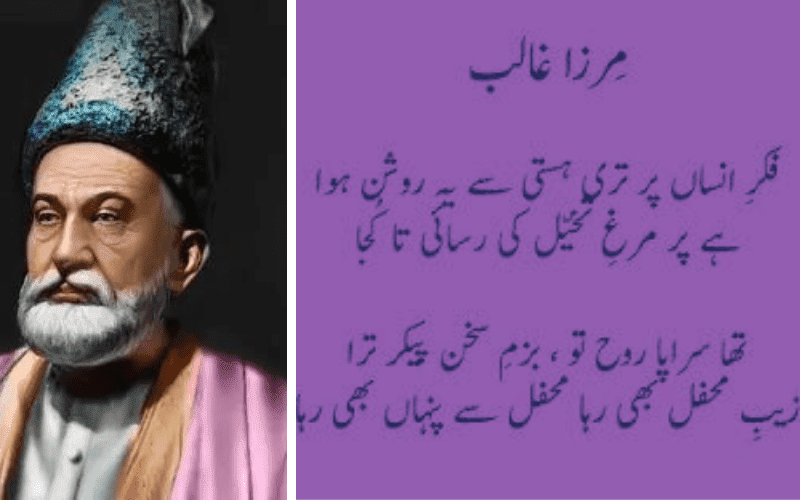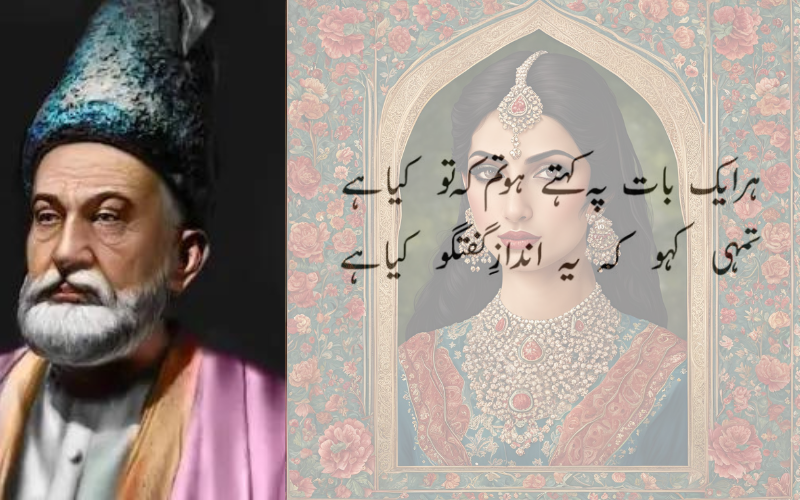Table of Contents
Introduction

Mirza Ghalib is an unrivaled character in Urdu poetry. Mirza Ghalib poetry, infused with intense emotions and intellectual depth, have left an unforgettable impression on the literary world. Mirza Ghalib poetry portrays the core of the human experience by delving into subjects such as love, grief, desire, and philosophical contemplation. This article dives into Mirza Ghalib’s greatest Urdu poetry, showcasing his timeless contributions that have remained popular with readers across decades.

Mirza Ghalib: A Brief
Mirza Ghalib in 1797, had a life of struggle and adversity, which had a deep impact on his poetry. He lived at a period of enormous political and social change, including the collapse of the Mughal Empire and the establishment of British control in India. Despite these obstacles,Mirza Ghalib literary talent blossomed, and he became a master of the ghazal, a lyrical genre that usually depicts the agony of loss and the beauty of love.

Mirza Ghalib poetry is distinguished by its philosophical themes and exploration of deep emotions. His lyrics frequently reflect a deep feeling of sorrow, but they also express a desire for transcendence and purpose in an uncertain world.
The Elegance of Ghalib’s Ghazals
Mirza Ghalib ghazals are regarded as some of the greatest poetry in Urdu, known for their exquisite beauty and emotional depth. His grasp of the language is clear in every lyric, where he skillfully mixes imagery, metaphor, and emotion. One of his most famous couplets, “Hazaaron khwahishen aisi ke har khwahish pe dam nikle / Bahut nikle mere armaan lekin phir bhi kam nikle” (I have thousands of desires, all worth dying for / Many of them have been fulfilled, but they are still insufficient), captures the human condition with poignant simplicity.
Mirza Ghalib frequently addresses the conflict between the earthly and the heavenly, the temporal and eternal. His poetry reveals a strong connection with the metaphysical, as he explores issues of life, fate, and the meaning of the self. Ghalib’s ghazals are more than just personal laments; they are profound reflections on the human experience.
Thematic Richness in Ghalib’s Poetry
One of the reasons Mirza Ghalib’s poetry is still so popular is its topical diversity. He goes into the nuances of love, not just as a romantic ideal, but also as a deeply spiritual experience. His poetry frequently blurs the distinction between worldly and divine love, echoing the Sufi tradition of seeing love as a bridge to the holy.

Ghalib’s investigation of love is complex; his lines express both the joy and grief of love, the thrill of unity and the agony of separation. In the couplet “Ishq par zor nahin hai ye woh aatish Ghalib / Jo lagaye na lage aur bujhaye na bane” (Love cannot be forced, Ghalib / It is a fire that cannot be kindled or quenched), Ghalib expresses the insatiable and all-consuming quality of love.
Another common topic in Ghalib’s poetry is the fleeting nature of existence. His poetry frequently dwell on the certainty of death and the ephemeral nature of earthly joys. Even in his reflection on death, there is a feeling of acceptance, an awareness of the beauty in life’s impermanence.
Ghalib’s Legacy in Urdu Poetry
Mirza Ghalib’s contribution to Urdu poetry is immense. His work has influenced innumerable poets and is still inspiring people who want to comprehend the complexity of the human heart today. Ghalib’s poetry crosses temporal and cultural borders, connecting with audiences not just in Urdu-speaking countries but even beyond.
Ghalib’s legacy is also visible in how his poetry has been transformed into many creative forms, including as music, theater, and film. His ghazals have been performed by some of the most talented voices in the Indian subcontinent, bringing his lyrics to life in ways that continue to touch the soul.
Conclusion
Mirza Ghalib’s poetry is the peak of the Urdu literary heritage. His lyrics, full of passion and intellectual depth, provide a glimpse into the human spirit, portraying the common sensations of love, grief, and desire. As one of the most acclaimed poets in Urdu language, Ghalib’s work is as important today as it was then. His poetry is not only meant to be read, but also felt, as it continues to resonate with readers seeking refuge and understanding in the ageless beauty of his writing.
